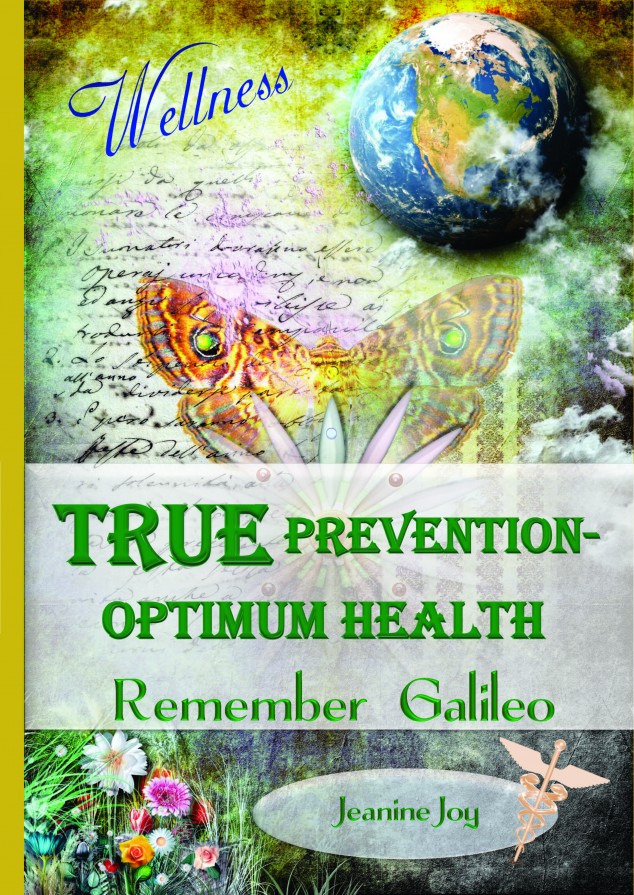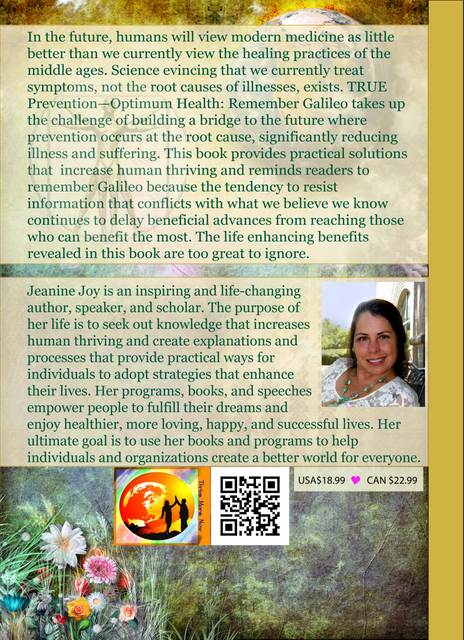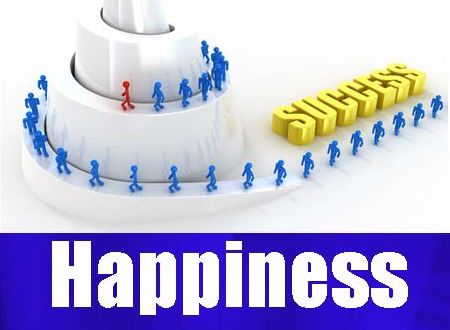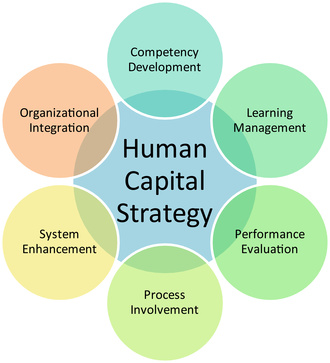Corporate Wellness: Is Yours Missing a Critical Ingredient?
The Current State of Corporate Wellness Programs
Workplace wellness programs are missing the key ingredient to true prevention. They focus on early diagnosis, symptom and lifestyle management while ignoring the elephant in the room–the one common factor at the root of everything.
While meeting with a representative of a large regional health system’s workplace wellness division, I asked him what their solution was for addressing stress. He mentioned their EAP (employee assistance program) offered counseling but said that was all they had. He also said many employers recognize that stress has both a negative effect on worker’s health and on their contributions at work. He was excited by our program but when he took the information back to his employer they said they had all the knowledge they needed in-house. If that is true, why are they excluding stress management skills training from their workplace wellness program?
The research about stress is clear. Workplace wellness programs tend to focus on the same areas and stress management skills would help improve the results in every one of them.
Smoking cessation.
Stress plays a role in the ability of individuals to quit smoking and maintain their status as non-smokers. Anxious individuals find it the most difficult to quit. Anxiety and smoking behavior are highly correlated.
Weight Management/Obesity/Anorexia/Bulimia
Researchers have demonstrated that the old paradigm of weight management is too simplistic because it ignores the impact of stress on the digestive system. The digestive system does not function as well when an individual is stressed and chronic stress contributes significantly to the development of diabetes. Stress also results in unhealthy food choices. Food is the number one anxiety drug.
Eating disorders often have their roots in low self-esteem. The design of our program leads to increases in self-esteem, which could provide relief for those who have eating disorders and prevent their development by those who are at risk of developing an eating disorder.
Diabetes Disease Management
The impact of stress on the digestive function has been linked to the development of diabetes. In 2007, the direct cost of diabetes in the United States was 174 billion. Indirect costs included 2.6 billion for absenteeism, 20 billion reduced productivity during work for the employed population, 7.9 billion unemployment from disease-related disability, and 26.9 billion lost productive capacity because of early mortality. Stress also has a direct impact on adherence to recommended treatments.
Physical Inactivity
Stress levels affect whether or not an individual will be active and choose to engage in physical activities. Highly stressed individuals who do not have an ingrained habit of physical activity are unlikely to develop the habit while they are stressed. Despite the fact that physical activity/exercise is often recommended as a dose dependent stress reduction method, such increases in physical activity do not consistently help stressed individuals because they do not feel sufficiently motivated.
Depression
By the time depression has developed, the individuals has typically been suffering from chronic stress for a sustained period of time. We need to educate employees (and the entire population) that tolerating stress is not the appropriate response. Coping until we’re depressed is a strategy that has made depression an epidemic with 10% of the US population suffering from it, according to the CDC.
Why are they not recommending early intervention to address stress? Because they think it requires expensive one-on-one treatment and because of the ridiculous stigma’s associated with mental health. Stress Management skills are simple to understand and implement. They are simple enough that kindergartners can understand the basics. Adults are a little more difficult and take a little longer to teach because they have developed a lot of false premises throughout their life that hinder their ability to adopt strategies that come quickly and easily to younger children. But it is still far from something that requires expensive one-on-one treatment. I can teach auditoriums full of people how to manage stress in meaningful ways that have a positive impact on their work and home lives right away and continue to increase as the techniques are applied.
Even individuals who suffered from repeated bouts of depression have now reported that they have been free of depressive episodes since learning these skills.
Poor Diet/Nutrition
Stress and happiness are opposite ends of the same continuum. Researchers have linked happiness with better food choices. Individuals in the top 25% of optimism scores ate more fresh vegetables, salads, berries, fruit and low fat cheese that other subjects in a research report comparing optimism to dietary habits. A meta-analysis done by researchers at Harvard and published in 2012 concluded that positivity and optimism led to better food choices and better choices about risky behaviors. Our stress management program increases happiness, positivity, and optimism.
Chronic Stress
The common recommendations for managing stress are all dose dependent. That would be fine if there wasn’t a better way, but there is. Dose dependent stress management is the same as taking a prescription pill to manage the symptoms–it does nothing to affect the underlying cause. Dose dependent means you have to do it in order to receive the positive results and if you don’t do it, you don’t get any results.
Because our program helps individuals change the root cause of the stress, it functions more like a cure. It does not prevent bad things from happening, but the response is more resilient, emotional intelligent, and less stressful than it would have been before they learned to use the skills we teach. The way the individual responds to the same stimulus that may have once made him or her highly stressed may not be at all stressful once the techniques have been applied for a while.
We all know that everyone reacts differently to circumstances. What stresses one person out may be fun to another person. I’ve studied what makes humans thrive for two decades and then developed programs that teach individuals how to develop the habits of thought that help them thrive.
The frequently recommended dose dependent stress reduction methods include exercise, going out in nature, helping someone else, petting your cat or dog, meditation, yoga, tai chi, and massage. While these methods are a good “pill,” they do not provide long-term benefits with the exception of a consistent meditation practice. But even consistent meditation does not address stress at the root cause.
Some recommendations can be counter-productive. One commonly recommended stress reduction method is to discuss the problem with a friend. The outcome of that discussion can go either way. I definitely have friends who would make it worse by focusing on the worse aspects of the situation and reminding me of other bad situations like the current one. I also have friends who would be beneficial to talk to but I’ve never seen this type of recommendation come with recommended parameters for the discussion.
Employee Engagement
This is not a typical focus of Corporate Wellness Programs although the hope is that the program will be perceived in a positive light. Our program also helps engagement in a variety of ways. The first is that it helps create a more inclusive and positively focused employee base. Working with people who are energetic, focused, and optimistic creates synergy and an environment that makes being at work enjoyable. The way any individual views his employer or any other aspect of his life reflects how he views everything in life. Someone who is generally dissatisfied with life is generally dissatisfied with her work. The reason for this is because our habits of thought play a tremendous role in the aspects we focus on in every area of our lives. If we focus on the aspects that we don’t like, we’re not engaged. If we focus on aspects that we find exciting, our engagement increases.
The inherent nature of our program increases the likelihood that employees will focus on aspects of their jobs and the company that they like.
Turnover/Retention
One of the most frequently cited reasons for turnover is not liking the people. A working environment where relationships are harmonious, where workplace conflict is unusual, where conversations are fruitful, and others are supportive would be very difficult to leave. The techniques I teach can accomplish this type of shift in corporate culture. Individuals who understand how to use the skills can even ignore outright attempts to upset their equilibrium without feeling stressed or a need to retaliate. The techniques provide individuals with tremendous stability and equilibrium in their chosen emotional stance.
There is a song by Pharrell Williams that describes the steady emotional state:
“Here come bad news talking this and that, yeah,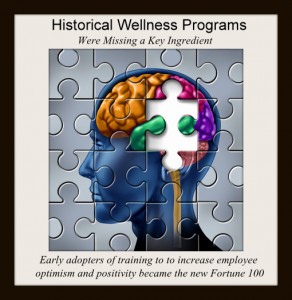
Well, give me all you got, and don’t hold it back, yeah,
Well, I should probably warn you I’ll be just fine, yeah,
No offense to you, don’t waste your time
Here’s why
Because I’m Happy”
I know, that to someone who is not generally happy the thought of being around a bunch of happy people is not very appealing but when everyone understands they can be happy and most are, the whole dynamic changes. Those who need a bit of help find it everywhere they look because one of the most natural and frequent behaviors those who learn to be happier demonstrate is a desire to help others do the same.
Research shows that positively focused people are kinder and demonstrate better corporate citizenship.
Cognitive Ability
Stress diminishes our cognitive abilities. The same person is smarter when happy than he is when stresssed. Do you want your employees to make better decisions? Teach them how to reduce the stress in their lives. You can keep the same employees and gain a smarter workforce.
Absenteeism
Immune function decreases as stress increases. Research has shown that the severity of colds and flu are directly tied to positivity, wth the most positively focused experiencing the fewest symptoms and duration of illness. The most positively focused have sometimes not developed an illness at all, even after being deliberately exposed to the virus. The symptoms are not just self-reports. One study in particular actually measured symptoms, going as far as to weigh used tissues so that the results would not be slanted by the more pessimistic attitude. The pessimists reported more symptoms but they also had more symptoms.
Productivity/Presenteeism
The level of productivity is important to employers. In all except the most mindless, repetitive occupations repeated research has shown that optimists produce more than pessimists.
Although you may believe optimism and pessimism are inborn traits, they aren’t. They are habits of thought and individuals can change their habits of thought to make their life feel better.
Optimists are more successful than pessimists in study after study.
Sales
There is very solid evidence that even less qualified optimists outperform more qualified pessimists based on traditional measures of qualification. If optimism is not one of the considerations for hiring your sales staff you are leaving a lot of untapped potential on the table. Teaching your sales staff our stress management techniques would improve sales.
Ethics/Morality
The research is very clear that ethical behavior improves as positivity increases. Think about it. When the economy dips, white collar crime increases. The same stress that reduces cognitive ability leads individuals to faulty conclusions that result in them deciding to commit a crime.
Education Components
There are a number of false premises that hinder individuals from becoming happier and less stressed. One of them is that they should just be strong when they are faced with stressful situations. But the advice, such as think positive and decrease the stress in your life, is worthless without teaching them how.
Stress adversely affects every system in the body fairly quickly. It is something that should be dealt with as soon after it is experienced as possible. I’ll give you an example. Jealousy creates stress in the body. I am almost never jealous of anyone about anything. I recognize that feeling jealous is my seeing someone else experience something that I want but am perceiving I can’t be, do, or have. Earlier today I learned a friend was at a lecture at Harvard on psychoneuroimmunology and I felt jealous. I told my partner to tell our friend I was jealous (he was going to see him before I did). But I manage my emotional state to a really good place. I had not felt jealousy in a very long time. It did not feel good. Within less than five minutes I realized what I was doing and said, “Why am I feeling jealous? Why do I think that is something I can’t do?” Very quickly my jealous was gone, replaced by an attitude of being delighted that I have friends who attend those types of lectures and can intelligently discuss such subjects. I also affirmed that there was no reason I could not also attend a lecture like that. My jealousy is completely gone and I am now excited about the next time I’ll see my friend. I’m looking forward to hearing what he learned and comparing ideas. I can even ramp my emotional state up even higher. I know this man’s heart wants to help a lot of people, especially those who are the last to receive help, whether here in the USA or abroad. I can think about what he might have learned that will help him do that and feel even more positive emotions. I’ll stop there but the process could keep going. I’ve already shifted from jealousy to a bit of a natural high just by changing my perception but I have not begun to tap the potential positive emotions I could milk from this situation.
Do, however, notice that the circumstances did not change. He is still the one who attended the lecture. The only thing that changed was the only thing I could change, my perspective about it. My emotions improved as I assumed a more empowered perspective. My body no longer feels stress from assuming an unhealthy perspective.
I’ve been using these methods for years but it is not much more difficult for a novice to shift perspective and gain similar advantages.
We need to change our tolerance of stress. We need to help everyone understand that they should do what they can as soon as they can. It makes all the difference.
There are other false premises that interfere with optimal health that our program identifies and changes.
Attracting Quality
Attracting quality employees is critical to the success of your business. The iconic work cultures of our era will not have anything on a company that has incorporated the techniques in our program. You’ll have your pick of the best of the best–provided you provide a healthy work environment with opportunities to advance. Our program won’t change what your company does, only how it does it. There is another benefit I have not yet mentioned, that can help create an irresistible work environment.
Creativity
Creativity is just like cognitive ability as it related to stress. Creativity increases as happiness increases and decreases as stress increases. Ideas flow more readily to individuals who are positively focused. There is a second advantage that comes from our program that relates to this area. Many good ideas are wasted because the person who thinks them is afraid of how others will perceive the idea. Our program increases self-confidence and also the ability to feel good even if someone does not agree with us. The impediments that cause many good ideas to die before they are born is eliminated.
Diversity
Even diversity is positively impacted by our program. Research shows that positively focused individuals are naturally more inclusive. We have the ability to take your diversity initiatives to a higher level.
Resilience
We spend a lot of time planning for business continuity in the event of problems from busted water lines to epidemics and wars. But we tend to ignore the fact that people are required to execute those plans. In the disaster planning milieu, we assume people who are not directly taken out by the disaster will be functioning in their assigned roles. We forget that different people respond to stress in different ways and that the stress of a disaster could take out people who are not affected by the direct cause.
The best disaster plan you can create is worthless if your employees lack the resilience to persist during a disaster. Can they fulfill their duties in the midst of so much uncertainty?
I would far rather have resilient people and a mediocre plan than a great plan and staff with mediocre resilience levels. The resilient individual will retain the ability to think in dire circumstances that will be lost to someone who is less resilient. The best planning cannot predict all the variables. The resilient individual will be able to respond in the moment–when it counts. Those hero’s we love to watch on TV, who come through when bullets and bombs are all around? They’re resilient. Whether you adore MacGyver or Jack, it is their resilience that makes them able to persevere. My Dad tells me, Jeanine you could fall into an outhouse and you’d come out with a diamond ring. He has seen me repeatedly respond to circumstances that would devastate less resilient individuals in ways that make the outcome better than if the adversity had never happened.
Our program increases individual resilience, the ability to bounce back will be improved. It won’t matter if the strife is at work or personal, it will not drag them down as long as it would have without our training.
Sleep
Stress can adversely affect the ability to get a good night’s sleep in a number of ways. Stress can cause individuals to stay awake worrying about problems and it can cause them to wake up too early and be unable to go back to sleep. The stress of too many competing priorities can result in individuals simply not giving themselves enough time for adequate rest.
This is a significant concern to employers. Sleep deprivation can lead to more mistakes, including accidents. Inadequate sleep increases the risk of an automobile accident by three times.
Stress management skills reduce stress, allowing individuals to benefit from a better night’s sleep.
Emotional Intelligence (EQ)
Our program increases EQ in three of the four key areas because of the way the program is designed.
Final Question
Does your corporate wellness program offer a stress management solution that satisfies your needs? Does it address stress at the root cause? Why not?
Contact us today to learn more about how Happiness 1st Institute can help your company achieve a lot more of its potential.












